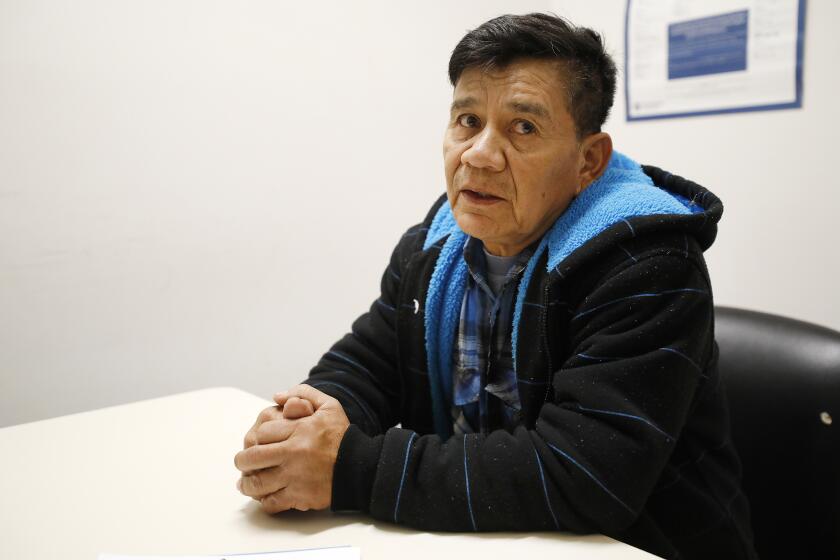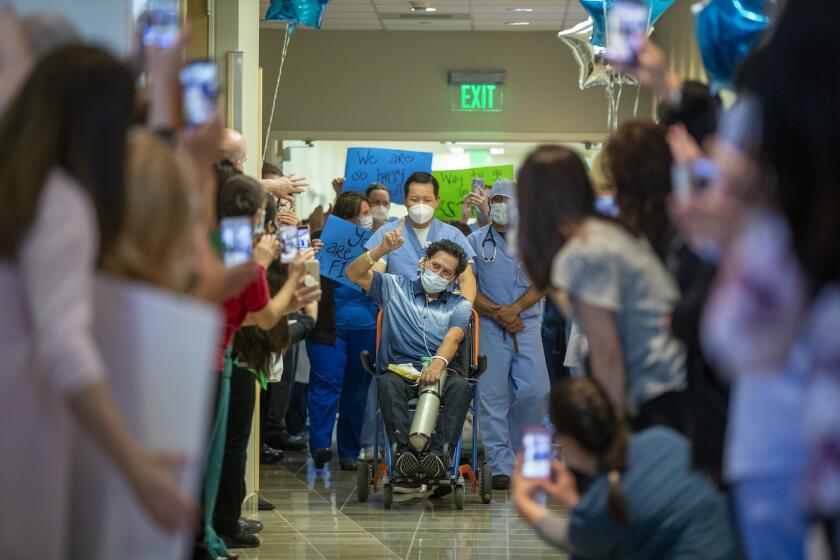Advocates say hundreds of immigrants detained in California are on hunger strike. ICE says only two
- Share via
On April 8, Jose Mendez, an immigrant held at Adelanto ICE Processing Center near Victorville, said things had noticeably changed at the facility: Some guards had started wearing masks, detainees could no longer leave their cells for yard time and meals were delivered to them.
Mendez said detainees had asked for their own masks, gloves and cleaning supplies to protect against the novel coronavirus, and facility staff promised they’d get some. But they were never delivered, he said. The 38-year-old had grown increasingly concerned about the virus, particularly because he has high blood pressure and diabetes. He wanted to get out but didn’t have a lawyer.
Two days later, Mendez and other detainees in his pod complained to guards who weren’t wearing masks about the lack of protection against the virus. He said their complaints were never addressed.
“We all collectively decided that we’d start a hunger strike if they won’t change,” Mendez said. “If one person becomes infected, we all do.”
Advocates say hundreds of immigrants detained in California facilities are now on hunger strike over conditions that leave them vulnerable to contracting COVID-19.
In court filings, ICE has argued that concern about detainees contracting coronavirus is “based on mere speculation” and that releasing large numbers of them would set a precedent that would persist even after the virus subsides. But ICE is instructing field offices to assess and consider for release those who were deemed to be at greater risk of exposure.
But officials with Immigration and Customs Enforcement said Friday that two detainees are on hunger strike at Adelanto and none at any other facility. According to ICE policy, facility staff must record detainees not eating for 72 hours before designating a hunger strike.
“ICE does not retaliate in any way against hunger strikers,” the agency said. “ICE explains the negative health effects of not eating to our detainees. For their health and safety, ICE closely monitors the food and water intake of those detainees identified as being on a hunger strike.”
Across the country, 124 immigrants and 30 ICE employees at detention centers have tested positive for the virus. With 18 confirmed cases, the second-largest outbreak among ICE detainees at any facility is at Otay Mesa Detention Center in San Diego.
Detainees have confirmed hunger strikes at Adelanto, Mesa Verde ICE Processing Facility in Bakersfield and Otay Mesa. Their demands include that ICE stop booking in new people, that all staff members wear masks and gloves, that detainees be provided with adequate hygiene supplies and that those experiencing coronavirus symptoms be tested.
These are some of the unusual new scenes across the Southland during the coronavirus outbreak.
ICE says detainees are regularly provided with soap and cleaning supplies. Facilities have increased social distancing by introducing staggered meals and recreation times, and suspending community service projects and social visits. The agency has released nearly 700 people deemed vulnerable and limited intake of new detainees. Nationwide, the detained population has dropped by 4,000 people since March 1 — a 60% decrease in book-ins compared with the same time last year — to 32,300 people, according to ICE.
Detainees dispute ICE’s assertions about prevention and containment efforts, saying they remain fearful for their lives. Lawyers have petitioned federal courts for the release of dozens of medically vulnerable detainees in California. Others have been released on bond or through humanitarian parole, which is free to people with a compelling emergency.
Citing violations of the 5th Amendment, the American Civil Liberties Union last week filed a class-action lawsuit against ICE to demand a drastic reduction in the number of detainees held at Adelanto amid the virus outbreak. With a capacity for nearly 2,000 detainees, Adelanto is one of the largest detention facilities in the country.
“ICE’s failure to take action to prevent the spread of COVID-19 at Adelanto puts immigrants detained there at grave risk of death or serious injury,” said Jessica Karp Bansal, senior staff attorney at the ACLU of Southern California. “It also threatens the surrounding communities, which are simply not equipped to handle a mass outbreak of COVID-19 at Adelanto.”
Jose Topete, a 51-year-old from Mexico, said he was moved a few weeks ago to a dorm with older and medically compromised detainees at Adelanto. He has diabetes, thyroid issues, ulcers and high blood pressure.
Topete said he is in charge of cleaning the floors of his dorm but hadn’t been provided with cleaning supplies.
“I’ve been mopping the floors with water only,” he said. “The situation is bad. They know my defenses are low.”
Also last week, California Atty. Gen. Xavier Becerra sent a letter to Chad Wolfe, the acting secretary of the Department of Homeland Security, urging the Trump administration to act immediately to minimize the spread of COVID-19 in immigration detention facilities and prevent “unnecessary loss of life.”
Detainees on strike at Mesa Verde responded with their own letter to Becerra and California Gov. Gavin Newsom on Friday, asking them to inspect facilities across the state and document the conditions placing detainees at risk of contracting the virus.
In its initial denial that a hunger strike was taking place at Mesa Verde, ICE called the claims a “shameful, coordinated campaign against truth.”
“This disgusting false propaganda being perpetrated by so-called advocacy groups under the premise of helping detainees does nothing more than spread misinformation that incites unnecessary fear throughout the community and among detainees,” spokesman Jonathan Moor said in a statement April 10.
Donovan Grant, a 44-year-old from Jamaica held at Mesa Verde, said his dorm of 100 men started their strike April 10 after breakfast. As of last Monday afternoon, Grant had missed nine meals.
That day, he said, the warden and other officials told the strikers that if they didn’t eat lunch, they would revoke their commissary. By that evening, officials told the strikers that they’d supply some of what they were asking, including paper towels and more soap. Grant said they put in one more soap dispenser but nothing else.
Feeling hopeful, a few men decided to eat dinner Monday night, Grant said. He didn’t.
“I woke up this morning and there was a new guy that came in,” Grant said Tuesday. “We’re trying to figure out the next move we should take.”
At Otay Mesa, a facility that holds immigrants for the purposes of deportation based on civil violations as well as inmates charged with federal immigration-related crimes, at least 18 ICE detainees and nine U.S. Marshals Service inmates have tested positive for coronavirus, the San Diego Union-Tribune reported.
On April 10, detainees there were told to sign contracts written only in English before receiving surgical masks. Some refused to sign. Facility staff members later did away with the waivers.
Sen. Kamala Harris (D-California) called for an investigation into the treatment of detainees at Otay Mesa after that incident was reported by the Union-Tribune.
Detainees throughout the facility protested and began hunger strikes last week, including a unit that holds female prisoners of the U.S. Marshals Service. The women spent several hours on Wednesday sitting on the floor to demand safeguards against coronavirus.
Ivan Nuñez Guadian, 44, is being held at Otay Mesa on a drug charge. Nuñez, a lawyer in his native Mexico, helped organize a hunger strike among about 100 inmates in his pod that started Wednesday.
He and other inmates who work in the kitchen refused to go after realizing that some of the plates they cleaned came from pods where there were confirmed COVID-19 cases. He knew the virus could survive for hours on plastic surfaces and asked that they begin serving food on disposable plates. Officials said no.
Nuñez, who has diabetes and heart issues and has been sick with flu-like symptoms, was among those who signed the contract for a surgical mask, saying he was afraid to defy authority. But he was disappointed to learn that the thin mask was supposed to last two weeks.
“We live shoulder to shoulder, skin against skin,” he said. “I have a cough. I want to know if I have the virus or not.”
Nuñez’s lawyer, Marcus Bourassa of the Federal Defenders of San Diego, said Saturday that his client’s pod was placed on a lockdown shortly after he spoke to The Times on Wednesday. Nuñez missed a court hearing Friday because the Otay Mesa staff took him to a local hospital out of concern about new COVID-19 symptoms he was experiencing.
They returned him to the facility Friday afternoon, Bourassa said.
More to Read
Sign up for Essential California
The most important California stories and recommendations in your inbox every morning.
You may occasionally receive promotional content from the Los Angeles Times.

















